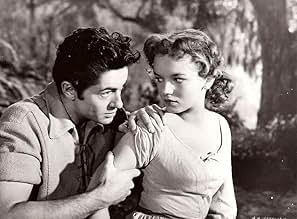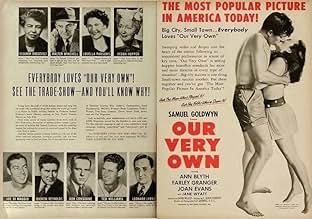Gail discovers the shocking news that she is adopted during a heated argument with her sister, Joan. With the reluctant support of her adoptive parents and baby sister, Penny, Gail goes in s... Read allGail discovers the shocking news that she is adopted during a heated argument with her sister, Joan. With the reluctant support of her adoptive parents and baby sister, Penny, Gail goes in search of her biological mother and true identity.Gail discovers the shocking news that she is adopted during a heated argument with her sister, Joan. With the reluctant support of her adoptive parents and baby sister, Penny, Gail goes in search of her biological mother and true identity.
- Nominated for 1 Oscar
- 3 nominations total
- Gwendolyn
- (as Rita Hamilton)
- Poker Player
- (uncredited)
- Poker Player
- (uncredited)
- Boy at Birthday Party
- (uncredited)
- Card Player
- (uncredited)
- Student
- (uncredited)
- Director
- Writer
- All cast & crew
- Production, box office & more at IMDbPro
Featured reviews
Despite obvious sincerity, the film's Hollywood treatment guarantees a predictable ending from the very start. I just wish the screenplay had dealt with the more difficult aspect of adoption—namely, the factor of an unknown genetic inheritance among those contemplating marriage and who care about such things. And that could well apply to an upwardly mobile neighborhood such as the Macaulay's. But including a genetic factor would have resulted in a much more difficult and darker film.
Still, it's an entertaining movie despite the compromises. That opening sequence is a gem of youthful high-spirits and frustration thanks to Natalie Wood and Gus Schilling even if he is doing schtick (as one reviewer noted). The scene is not just a good one, but also aims to persuade us that the Macaulay's are a real family like anyone else's. Anyway, I agree with those reviewers who find Blythe and Granger a little long-in-the-tooth to be playing teenagers, though it's one of the movie's lesser compromises. Yes, Ann Dvorak is good as the self-conscious birth mother. But I really like Joan Evans' turn as the jealous sister. Catch her subtle facial expressions as she goes through any one of her many emotional conflicts— a fine, unheralded young actress. Also standout is young Martin Milner. His totally unaffected teenager seems light years from his high school peer, the maturely sophisticated Blythe.
And speaking of Milner's gawky teen, I can't help noticing the chuckles we get from his rather callous treatment of pudgy, plain-Jane Gwendolyn (Rita Hamilton). For a film otherwise sensitive within its limits, that same concern apparently doesn't extend to an unattractive girl made the butt of mood lightening gags in a seemingly guilt-free manner. I'm not sure what the moral is, but I don't think it's a good one. Anyway, the movie remains an interesting, if idealized, time capsule of a period when apparently every teenage boy owned a hotrod.
As depicted in this typical period film people dressed more formally, even in hot weather (for whatever reasons!), with air conditioning yet to permeate even modern, well equipped homes. As a rule, practical personal dress comfort didn't prevail over formality until the 1960's.
The prolonged initial sequence showcases a wonderful nuisance of a girl (scene-stealing Natalie Wood) "helping" with the installation of a new television, the up and coming electronic marvel of the day (whose commercial success was on the verge of becoming reality, thanks in part to some price breaking discoveries that soon rendered TV sets sufficiently affordable for the masses). Boys and girls were portraying themselves while being quietly groomed for achieving good citizenship standards as defined by the generally conservative post-war period.
In "Our Very Own" personal relationships expressed themselves in ways that depicted subtle, yet significant differences from those of years to come, revealing an overall interesting and introspective perspective of the fairly tranquil, but brief period between World War II and the Korean War. The latter event broke shortly before the public release of this film in 1950. Meanwhile, as the storyline reveals, the "cold war" had already begun and, for many people, nuclear experimentation was beginning to command a scary center stage presence. Other "hot" issues of the day include McCarthy type anti-Communism (or Anti-Americanism as it was in actuality!), racial and ethnic equality and mixed sexual attitudes; but in "Our Very Own" we are deliberately steered inward, into family and personal matters, with the broad and burgeoning concerns of the day kept at bay...almost. Issues such as those mentioned above are not directly infiltrating any aspect of daily life in the treatment offered here, except for occasional inference. The period feel is thereby enhanced.
As "Our Very Own" grapples its way toward the emerging central theme of adoption, its still subtle stigmas of the times permeate the otherwise gentile facade of the featured suburbanite family. Ann Dvorak, in character, offers a fine portrayal as a birth mother as opposed to a rearing one. Her persona is carved from the "other side of the tracks" folks, but a sensitive manner prevails. She exudes pathos, yet maintains dignity for all concerned.
Now, some sixty years hence, we are treated to a time capsule view of an earlier, mostly bygone, America complete with some focal points of its day plus those things eternal that seem to pass through generations, oblivious to time and technology. The story line may be unremarkable (although it maintains interest) but the real and stylized adaptations of Middle American life at the time are enhanced by fine performances that lend a glimpse into aspects of our culture that were probably at least partly present at mid-century past.
One acoustic footnote: "Our Very Own" also concentrates on excellent sound and sensitive background music. An Oscar nomination was achieved for Best Sound Recording.
Did you know
- TriviaFilm debuts of Kipp Hamilton (as Rita Hamilton) and Phyllis Kirk.
- GoofsMrs. Macaulay tells Joan her birth certificate is in a "sealed" box. There is a lock on the box, but Joan opens it without a key. Her mother never mentions needing a key. There is a very good reason that box should have been locked. Mr. Macaulay produces a key later and locks the box.
- Quotes
Penny Macaulay: [about Chuck] He really is awfully cute, isn't he?
Joan Macaulay: [feigning ignorance] Who?
Penny Macaulay: [exasperated] President Truman!
- ConnectionsReferenced in La marche à l'enfer (1950)
- How long is Our Very Own?Powered by Alexa
Details
- Runtime
- 1h 33m(93 min)
- Color
- Aspect ratio
- 1.37 : 1


































